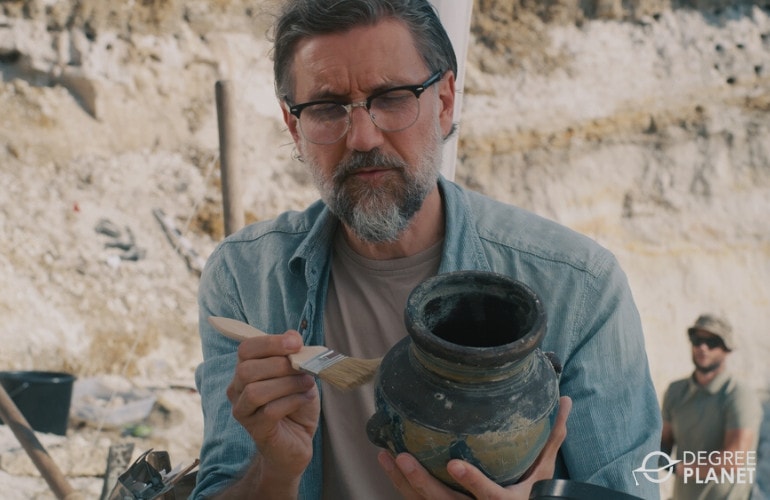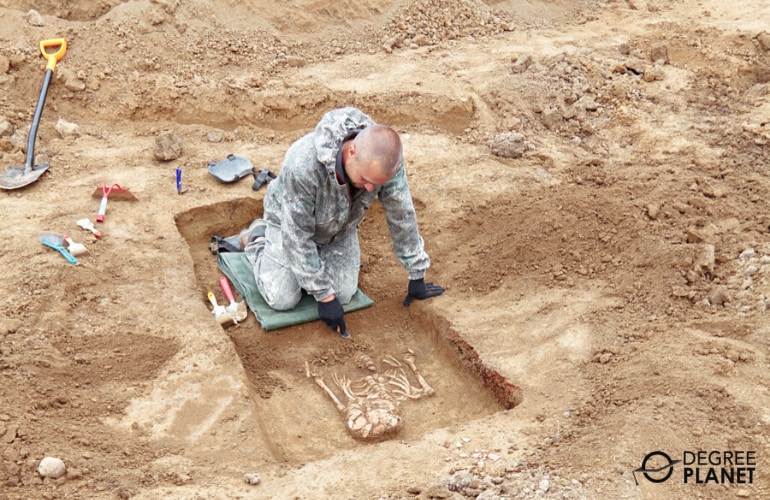You might consider pursuing an anthropology masters online if you are a curious individual with a drive to understand past and present-day communities and cultures.

Anthropologists spend their time studying the history of humans, including their development and behaviors. Because there are many different skills required of an anthropologist, an advanced degree in this field can open up professional opportunities in a variety of industries.
Editorial Listing ShortCode:
If you’re ready to enhance your expertise, an MA in Anthropology online program can help you strengthen your skills of observation, communication, and data collection and analysis.
Online Anthropology Masters Programs

In an online anthropology master’s program, you’ll have the opportunity to study human cultures and communities from the past and present.
At the heart of the anthropology discipline is the desire to understand the many facets of the human experience. Anthropologists often examine the connection between language, nature, and culture as they conduct research, observation, and analysis.
Editorial Listing ShortCode:
Many students who choose to earn an advanced degree in anthropology are passionate about solving real-world issues and using their research to help communities.
As you begin your anthropological studies, you’ll be required to take core courses specific to your university. In addition to these courses, you may have the option to choose a subfield in which to focus the remainder of your studies.
Four main subfields of anthropology are:
- Archaeology
- Biological anthropology
- Linguistic anthropology
- Sociocultural anthropology
The specialization you select will likely depend on which aspect of the human experience you find most compelling. Your specific curriculum will likely vary depending on your program and the subfield you choose to focus on. An anthropology masters program generally covers topics like:
- Social anthropology
- Physical anthropology
- Linguistic anthropology
- Qualitative research methods
- Religion and culture
Many students who earn their online anthropology master degree go on to pursue professional roles in which they can have a positive impact on society. Some common careers for anthropology graduates include:
- Historian
- Anthropologist
- Museum curator
- Policy analyst
- Professor
- Survey researcher
The study of anthropology cultivates an understanding of research methods, data analysis, and written communication. Graduates from these programs are often equipped for work in a range of fields.
Common Online Masters in Anthropology Specializations

While every program will have its own available anthropology specializations, here are some common options across online master’s programs:
- Evolutionary: Sometimes referred to as biological anthropology, this specialization focuses on examining the evolution of humans. Topics covered may include genetics, behavior, and disease.
- Medical: At the center of medical anthropology is an effort to understand health and medical practices across a variety of different contexts, including gender, politics, and culture.
- Linguistic and Semiotic: Linguistic and semiotic anthropology is dedicated to studying the impact of different forms of communication on human culture. For example, you might study how language contributes to the formation of power relations or identity.
- Sociocultural: This branch of anthropology focuses on exploring complicated societal systems and examining how human behavior is similar and different between communities.
- Archaeology: This subfield of archaeology is concerned with understanding the history of a people or society by examining the artifacts and evidence they have left behind.
It can be helpful to consider your career aspirations and interests as you begin the process of selecting the right specialization for you.
Anthropology Careers and Salaries

Professionals who earn advanced degrees in anthropology often find positions in government or community service programs. Others choose to enter into roles within academia or the private sector.
The fields you can qualify for will likely depend on the areas that you’re passionate about as well as the specialization you choose to study. According to the Bureau of Labor Statisticsociologistss, here are some career paths, along with their median salaries, that are related to the study of anthropology:
| Careers | Annual Median Salaries |
| Advertising, Promotions, and Marketing Managers | $133,380 |
| Political Scientists | $122,510 |
| Junior College Anthropology and Archeology Teachers | $115,520 |
| Sociologists | $92,910 |
| Social and Community Service Managers | $74,000 |
| Anthropologists and Archaeologists | $61,910 |
| Historians | $63,940 |
| Health Education Specialists |
$60,600 |
| Survey Researchers | $59,740 |
| Archivists, Curators, and Museum Workers | $50,120 |
A strong understanding of human behavior, research, and analysis is beneficial for careers in sales, marketing, academia, and healthcare. While a masters in anthropology degree program can help you qualify for a range of fields, the degree does not guarantee a specific salary range or title.
Editorial Listing ShortCode:
The program you attend, your selected specialization, and the area in which you live can all contribute to your future career prospects and qualifications.
M.A. in Anthropology Curriculum & Courses

Although the courses offered by online graduate programs in anthropology vary, there are some you will likely take:
- Social Anthropology: This course includes studies and examinations of a large variety of human cultures throughout the world.
- Linguistic Anthropology: This course provides the opportunity to study how language impacts and creates culture as well as its role in community thought and power dynamics.
- Biological Anthropology: Focusing on evolution, this class explores the development of humans and primates through evolutionary theory, fossil records, and biology.
- Qualitative Research Methods: Intending to cultivate the foundational skills needed to conduct qualitative research, this class explores topics like ethnography, case studies, and thematic synthesis.
- Archaeology: This class focuses on studying artifacts and relics of the past in order to understand and visualize prior cultures and communities.
- Anthropological Theory and Methods: This course focuses on the foundations of anthropological theory and research methods and covers topics like contemporary evolutionism and cultural ecology.
- Research Design and Methodology: This class discusses concepts essential to research design, including sampling, interviewing, and focus groups.
- Quantitative Anthropology: This course explores different quantitative methods used in anthropological research, such as organizing data, presenting data, and probability.
- Ethnicity and Identity: This course delves into the concepts of race and ethnicity, examining how these are impacted by different social and political structures.
- Medical Anthropology: Combining the study of health with foundations of anthropology, this course examines areas such as healthcare systems and infectious disease.
The courses you take will also be affected by your personal choices, such as the subfield you choose to focus on.
Admissions Requirements

Most colleges and universities evaluate applicants on a number of different factors, including academic records, prior work experience, and character.
While institutions can differ in their exact applications, here are some common requirements:
- GRE or GMAT scores (only if required)
- Official transcripts
- Personal essay
- Letters of recommendation
- Resume
Colleges also use your application materials to help them develop a picture of who you might become as a student at their school. They want to know that you will likely experience academic and professional success as a result of attending their educational program.
Anthropology Graduate Programs Accreditation

The status of regional accreditation signifies that an educational facility meets official standards of quality. These standards outline the requirements for excellence in several areas, including curriculum, student services, and funding.
Editorial Listing ShortCode:
Attending an accredited masters in anthropology online program can benefit you in many ways. It keeps the option of receiving financial aid open, and it also helps to ensure that you will be taught by qualified professionals.
In general, future employers also want to see that you’ve attended an accredited university because it signals that you should have learned the necessary skills to be proficient in the field.
Financial Aid and Scholarships

For many applicants, the option to receive financial aid turns the dream of attending college into a reality. A large number of students apply for federal or state financial aid over the course of their college careers.
The amount of federal and state you can receive is determined by several factors of eligibility, including family income level and enrollment status. Filling out the Free Application for Federal Student Aid (FAFSA) will let you know the amount of need-based financial help you are qualified to receive.
In addition to federal and state aid, many schools offer scholarships. Scholarship opportunities have specific guidelines for applying and will differ between schools.
Many companies also offer a tuition reimbursement option as part of their benefits package. If you are currently employed, you can review your benefits to see if that is available to you.
What Do Anthropologists Do?

Anthropologists dedicate their work to the study of the evolution of human culture and society. Since there are several subfields within the field of anthropology, there are also many potential career opportunities.
Some anthropologists go on to pursue careers in the public sector, such as within local government or healthcare systems. Others go on to become leaders in the private sector, curating exhibits at museums or conducting historical research.
No matter the position they choose, most anthropologists bring their ability to analyze and communicate their research and findings to their professional roles.
Are Anthropologists in Demand?

Yes, there are many career openings within the field of anthropology. According to the Bureau of Labor Statistics, the employment of anthropologists and archaeologists is expected to grow by 7% over the next ten years.
Additionally, careers related to anthropology—such as archivists, curators, and museum workers—are experiencing job growth much higher than the national average. All of this projected expansion in employment will likely result in a variety of available positions across fields connected to anthropology.
How Much Do Anthropologists Make?
The amount that an anthropologist can make varies depending on several factors, including their job title, the field they work in, and their geographic location.

Anthropologists and archaeologists, for example, have an annual median salary of $61,910 (Bureau of Labor Statistics). Most make between $37,870 and $99,830, depending on their experience and employer. Some anthropologists go on to work for museums.
According to the Bureau of Labor Statistics, most curators, archivists, museum technicians, and conservators earn between $30,450 and $96,500 each year.
Other anthropology experts make top earnings in leadership positions in marketing, public relations, and other sectors that deal with societal behavior. An advanced degree in anthropology does not guarantee a specific salary or title, but it can help you pursue rewarding careers.
What Degree Do You Need to Be an Anthropologist?
While there are anthropology assistant roles that can be filled by those with bachelor’s degrees, the minimum education for an anthropologist is a master’s degree. Educational requirements can vary depending on the specific position and employer, but most positions require a master’s degree or higher.
Editorial Listing ShortCode:
For instance, postsecondary anthropology professors are expected to obtain a doctorate degree. An increasing number of universities now offer PhD in Anthropology online programs in addition to their on-campus options.
Junior and community colleges, on the other hand, often hire teachers who only hold master’s degrees. Historians, museum curators, and sociologists typically need a master’s-level education as well.
What Can You Do with a Masters in Anthropology?
There are many professional opportunities available for someone with a master’s degree in anthropology to pursue. The analytical, communication, and writing skills your graduate studies can help you develop can make you a promising candidate for a variety of fields and leadership roles.
Many graduates choose to work in postsecondary education, archaeology, museum curation, or marketing. The Bureau of Labor Statistics lists archivists, anthropologists, and sociologists as some of the common professions for those with advanced degrees in anthropology.
How Long Does It Take to Get an Online Anthropology Masters Degree?

A master’s degree can generally be completed in 1 to 2 years. A program with only 36 credit hours and no thesis requirement can typically be completed in 1 year, assuming that you are enrolled full-time and year-round.
If your program requires the completion of a thesis, this can extend the time it takes you to finish. Attending school part-time can also lengthen the amount of time you spend earning your degree. Considering factors like your short-term and long-term availability can help you select a program that aligns with your needs.
What’s the Difference between an Archaeology vs. Anthropology Master Degree?
Archaeology and anthropology share an overall goal but differ in their methods of research.
| Archaeology | Anthropology |
|
|
Archaeology is considered to be a branch of anthropology that delves deeper into the study of material relics from historical communities. If you are more interested in discovering and examining artifacts, this could be an alternate degree path to consider.
Is an Online Anthropology Master’s Degree Worth It?
Yes, an online anthropology master’s degree is worth it for many professionals. The interdisciplinary nature of a masters in anthropology degree online program makes it possible to pursue jobs in many different sectors. For example, some graduates use their skills as professors, market researchers, or historians.
Editorial Listing ShortCode:
The Bureau of Labor Statistics also states that many positions related to anthropology—such as anthropologists and marketers—are experiencing job growth that is either on par or faster than the national average.
Universities Offering Online Masters in Anthropology Degree Programs
Methodology: The following school list is in alphabetical order. To be included, a college or university must be regionally accredited and offer degree programs online or in a hybrid format.

The Master of Applied Anthropology at Cal Poly Humboldt is a cross-discipline program. It joins elements of the sciences, arts, and professional studies to help students develop an understanding of human cultures and biodiversity.
The program is comprised of mostly online learning that is complemented by an initial intensive on campus. Full-time students can typically complete the program in 2 years, and part-time students can typically complete it in 3 years.
Cal Poly Humboldt is accredited by the WASC Senior College & University Commission.

The Master’s in Anthropology program at the California Institute of Integral Studies is different from other programs due to its focus on activism and social justice. It covers fundamental anthropological concepts and critical theory that can be applied in graduates’ future work in their communities and fields.
The California Institute of Integral Studies is accredited by the WASC Senior College and University Commission.

Students with special interests in archeology may find an ideal fit in the Master of Arts in Anthropology program at Eastern New Mexico University. Students in the program can take courses in Paleoindian studies, lithic technology, zooarchaeology, and more.
The program can help prepare graduates for continued doctoral education and many public and private archaeological endeavors.
Eastern New Mexico University is accredited by the Higher Learning Commission.

Eastern University offers a Master of Arts in Theological and Cultural Anthropology. The program utilizes anthropological and biblical principles to help students develop a holistic understanding of culture that they can apply across multiple disciplines and fields.
The fully online program consists of 33 credit hours and can potentially be completed in just 1 year.
Eastern University is accredited by the Middle States Commission on Higher Education.

The Master of Arts in Intercultural Studies program at Evangel University appeals to students with a variety of interests.
Students may take concentrations in Intercultural Studies, Global Missions, Member Care, or Islamic Studies. The program is designed to equip graduates with leadership, communication, and interpersonal skills that can help them thrive in global, interfaith roles. Students in the program must complete 48 credits to graduate.
Evangel University is accredited by the Higher Learning Commission.

In Harvard University’s Master of Liberal Arts in Anthropology, on-campus and virtual students have the opportunity to form deep connections with their colleagues. At the heart of the program is the ability to analyze cross-cultural characteristics in order to understand our collective societal values. Students also have the option to add a social justice graduate certificate to their degree.
Harvard University is accredited by the New England Commission of Higher Education.

Idaho State University offers both a Master of Arts and a Master of Sciences in Anthropology. Students in either program may specialize in either Ecological, Medical, and Archaeological studies or Linguistics, Informatics, and Oral History studies.
Both programs consist of 30 credits and can be completed fully online in part-time or full-time schedules.
Idaho State University is accredited by the Northwest Commission of Colleges and Universities.

The Master’s in Anthropology at Portland State University offers over 60 courses for students to choose from, including lecture, online, seminar, and lab classes. Students’ studies culminate in a thesis, an internship, or a test-based assessment.
The program is designed to equip students with the skills needed to pursue careers in a variety of applied anthropological subfields.
Portland State University is accredited by the Northwest Commission on Colleges and Universities.

At the University of Alaska—Anchorage, the Master’s in Anthropology degree program focuses on the languages, culture, and history of southern Alaska and the Aleutians. This applied anthropological emphasis is often an excellent fit for those wanting to pursue specific career fields pertaining to this topic.
Graduates often obtain jobs in the government, consultancy firms, and partnerships with agencies and private businesses.
The University of Alaska – Anchorage is accredited by the Northwest Commission on Colleges and Universities.

Students have the option to pursue a Master of Arts or Science in Applied Anthropology at the University of North Texas.
Both programs consist of 36 credits that can typically be completed in 3 years. These programs are housed online and have flexible schedules, encouraging students to further their education while honoring commitments or geographic constraints.
The University of North Texas is accredited by the Southern Association of Colleges and Schools Commission on Colleges.
Getting Your Anthropology Masters Online

For ambitious professionals who are eager to deepen their understanding of human culture and society, an advanced degree in anthropology can be an exciting next step.
In addition to industry-specific skills, you can also develop stronger communication and problem-solving skill sets. If you’re interested in advancing your anthropological studies, it might be time to start applying to graduate programs that fit your professional goals.
You can get started today by researching accredited anthropology masters programs online.

